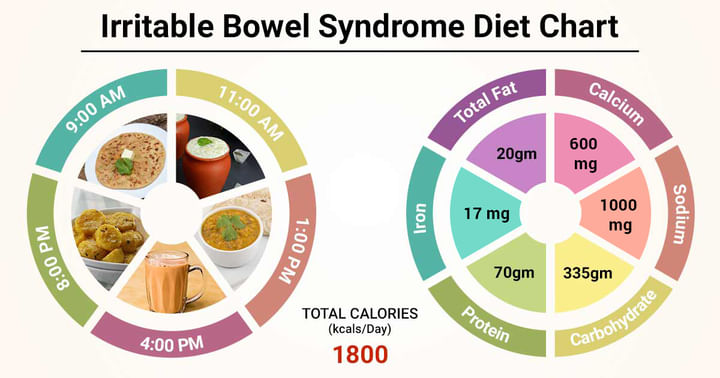Diet Chart For irritable bowel syndrome
Last Updated: Dec 20, 2022
About
A collection of digestive problems are referred to as irritable bowel syndrome. This includes gas, nausea, constipation, and bloating. Globally, a large number of the population is affected by this disorder.
It has become common with the destructive life cycle of people. Due to its several complications, it must be treated on time. IBS treatment must require dietary changes. Diets play an important role in suppressing or triggering the root causes of IBS.
Therefore, we must be vigilant in choosing a perfect IBS diet. We need to include those foods in our diet that are high in fiber and other essential minerals to manage IBS symptoms-
- Oatmeal
- Whole grain cereals
- Fish
- Lean meat
- Fruits
- Water
- Green leafy vegetables, etc.
The nutrients mentioned above will aid in hastening the healing process. Along with them, we also need to be aware of the foods that we need to avoid. Those could be fibreless or junk foods, such as
- Caffeine
- Nuts
- Carbonated beverages
- Foods with a high fructose content
- Dairy products except for yogurt
These foods can flare up the symptoms so we must exclude them from our everyday meals. Consumption of dairy products is prohibited but yogurt can help to relieve the symptoms.
Summary- Foods help to combat this disorder to a certain extent. If we incorporate an ultimate diet during the treatment process, it will speed up recovery.
Diet Chart
| Sunday | |
| Breakfast (8:00-8:30AM) | 2 potato stuffed chapatti + ½ cup tea |
| Mid-Meal (11:00-11:30AM) | 1 cup Chhach |
| Lunch (2:00-2:30PM) | 1 cup moong dal + 1 cup karela + 2 chapatti + ½ cup rice + 1/2 cup curd |
| Evening (4:00-4:30PM) | 1 cup tea + murmure handful |
| Dinner (8:00-8:30PM) | 1 cup dum aloo + 2 chapatti |
| Monday | |
| Breakfast (8:00-8:30AM) | 1 cup vegetable poha + 1 cup curd |
| Mid-Meal (11:00-11:30AM) | 1 cup coconut water |
| Lunch (2:00-2:30PM) | 1 cup arhar dal + 1 cup ghia veg + 2 chapatti + ½ cup rice + 1/2 cup curd |
| Evening (4:00-4:30PM) | 1 cup tea + 2 atta biscuits |
| Dinner (8:00-8:30PM) | 1 cup carrot peas + 2 chapatti |
| Tuesday | |
| Breakfast (8:00-8:30AM) | 1 cup vegetable idli + 1 cup curd |
| Mid-Meal (11:00-11:30AM) | 1 apple |
| Lunch (2:00-2:30PM) | 1 cup chana dal + 1 cup lotus stem and potato + 2 chapatti + ½ cup rice + 1/2 cup curd |
| Evening (4:00-4:30PM) | 1 cup tea + handful makhane |
| Dinner (8:00-8:30PM) | 1 cup mattar mushroom + 2 chapatti |
| Wednesday | |
| Breakfast (8:00-8:30AM) | 2 carrot stuffed chapatti + ½ cup tea |
| Mid-Meal (11:00-11:30AM) | 1 cup Chhach |
| Lunch (2:00-2:30PM) | 1 cup masoor dal + 1 cup cabbage mattar + 2 chapatti + ½ cup rice + 1/2 cup curd |
| Evening (4:00-4:30PM) | 1 cup tea + 1 toasted bread |
| Dinner (8:00-8:30PM) | 1 cup tori + 2 chapatti |
| Thursday | |
| Breakfast (8:00-8:30AM) | 2 moong dal cheela with paneer stuffing with green chutney |
| Mid-Meal (11:00-11:30AM) | 1 cup coconut water |
| Lunch (2:00-2:30PM) | 1 cup toor dal + 1 cup beans aloo + 2 chapatti + ½ cup rice + 1/2 cup curd |
| Evening (4:00-4:30PM) | 1 cup tea + 2 hard toast |
| Dinner (8:00-8:30PM) | 1 cup beans + 2 chapatti |
| Friday | |
| Breakfast (8:00-8:30AM) | 2 stuffed chapatti + ½ cup tea/ 1 cup vegetable poha + 1 cup curd |
| Mid-Meal (11:00-11:30AM) | 1 pear |
| Lunch (2:00-2:30PM) | 1 cup rajma + 1 cup gobhi aloo + 2 chapatti + ½ cup rice + 1/2 cup curd |
| Evening (4:00-4:30PM) | 1 cup tea + handful makhane |
| Dinner (8:00-8:30PM) | 1 cup pumpkin + 2 chapatti |
| Saturday | |
| Breakfast (8:00-8:30AM) | 1 cup vegetable bread upma + 1 cup curd |
| Mid-Meal (11:00-11:30AM) | 1 cup Chhach |
| Lunch (2:00-2:30PM) | 1 cup white chana + 1 cup paneer bhurji + 2 chapatti + ½ cup rice + 1/2 cup curd |
| Evening (4:00-4:30PM) | 1 cup tea + 2 atta biscuits |
| Dinner (8:00-8:30PM) | 1 cup bhindi + 2 chapatti |
Food Items To Limit
- Dairy products for people who are lactose-intolerant.
- High-fiber foods, such as raw fruits and vegetables, and whole grains, bran.
- gas-producing foods such as cabbage, broccoli, and onions, and foods with hulls, such as seeds, nuts, and corn.
- High-fat foods, such as fried foods, butter and margarine, mayonnaise, peanut butter, nuts, ice cream, and fatty cuts of red meat.
- Spicy foods.
- Foods with caffeine, such as chocolate, tea and coffee.
- Carbonated drinks.
- Alcohol.
Do's And Dont's
Don'ts:
- Avoid Caffeine or Alcohol
- Avoid eating high fibre legumes
- Avoid Processed Foods
- Avoid Dairy Products
- Avoid whole Nuts
Do's:
- Choose Lean Meats & Protein
- Eat Cooked Vegetables
- Eat Bland Food
- Eat Smaller Meals
- Keep a Food Diary
Food Items You Can Easily Consume
- cereal- oatmeal, rice, pasta
- fruits and vegetables- banana, stewed apple, avocado, potato,okra,pureed vegetable soups, lettuce
- meat and eggs- fish (salmon), lean chicken, turkey, eggs
- pulses and legumes
- fats and oils- 3-4 tsp oil/ day
- sugars- 1-2 tsp table sugar/ day
- milk and milk products- yogurt, skim milk, almond milk
References
- Halmos EP, Power VA, Shepherd SJ, Gibson PR, Muir JG. A diet low in FODMAPs reduces symptoms of irritable bowel syndrome. Gastroenterology. 2014 Jan 1;146(1):67-75. [Cited 01 July 2019]. Available from:
- Heizer WD, Southern S, McGovern S. The role of diet in symptoms of irritable bowel syndrome in adults: a narrative review. Journal of the American Dietetic Association. 2009 Jul 1;109(7):1204-14. [Cited 01 July 2019]. Available from:
- Friedman G. Diet and the irritable bowel syndrome. Gastroenterology Clinics of North America. 1991 Jun;20(2):313-24. [Cited 01 July 2019]. Available from:
Table of content
Find Dietitian/Nutritionist near me
Ask a free question
Get FREE multiple opinions from Doctors



